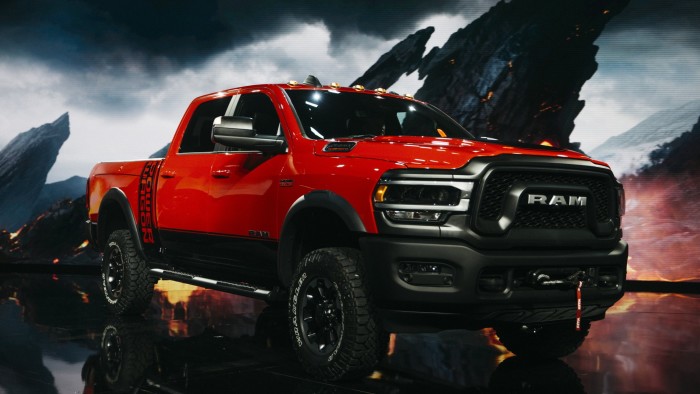Unlock the White House Watch newsletter for free
Your guide to what the 2024 US election means for Washington and the world
When you’re forced to listen to Trumpite complaints about America’s trading partners ripping off the US, one grievance in particular routinely emerges: US roads and garages are full of Volkswagens, Hyundais and Toyotas, but the rest of the world won’t buy American cars.
Europe is the main target of this outrage, and the old statistic gets another airing that the EU imposes a 10 per cent tariff on autos from the US, four times the 2.5 per cent the latter charges on cars from Europe. In reality it’s the US’s own long-standing auto protectionism that has fostered an inward-looking and globally uncompetitive industry and one now falling behind in the electric vehicle (EV) revolution. Donald Trump’s utterly absurd 25 per cent tariff on cars and car parts shows he has learnt the wrong lesson.
To address that well-worn talking point: the EU import duty on standard cars such as hatchbacks and minivans is indeed 10 per cent versus the US’s 2.5 per cent. But the US production of light trucks, including pick-ups, has long sheltered behind a 25 per cent tariff wall. The duty is known as the “chicken tax” after Lyndon B Johnson imposed it in 1964 in retaliation for European levies on American poultry.
Industry experts say the Big Three car companies in Detroit — Ford, General Motors and Chrysler (now part of the Stellantis group) — have accordingly increasingly focused their innovation on making pick-up trucks and used the same platforms and components to develop gas-guzzling large sport utility vehicles (SUVs). Felipe Munoz, senior analyst at the market intelligence company Jato Dynamics, told me that while pick-ups and heavy SUVs were only 17 per cent of US light vehicle sales, “it’s where the Big Three US manufacturers make most of their money in the American market”.
The rest of the world, however, tends to have narrower roads and higher fuel taxes than the US. “The protection has made the US car manufacturers less competitive globally,” Munoz told me. Japanese companies make family cars popular around the world: Detroit does not. The biggest car exporter from the US is the German BMW, not a US manufacturer.
When American car companies have actually responded to their European customers, they have succeeded, including by manufacturing there. Ford has had a long-standing position in the European market, including consistently being one of the best-selling brands in the UK. But it’s now struggling, having discontinued popular smaller cars to concentrate on SUVs. GM five years ago sold the Opel brand it had run in Europe for decades to focus on bigger vehicles in its home market.
It’s not EU protectionism that hurts American carmakers abroad. The European Commission has long had an open offer to the US to cut all industrial goods tariffs including cars to nil, which the US has failed to take up. Still the sense of victimhood persists.
Despite Tesla’s pioneering role in EVs, the traditional US manufacturers ceded ground to China by being slow to move into the new technology, even more than their sluggish European counterparts. The EU has recently taken a pragmatic approach of using targeted tariffs, together with joint ventures and tech transfer with Chinese companies, to give its carmakers space to catch up in its domestic market.
But the Biden administration attempted to create a North American EV industry behind a protective wall. It created limited tax credits while hitting Chinese imports with 100 per cent tariffs and banning Chinese auto software, pressing Canada and Mexico to do the same. As of 2023, the share of EVs in total US auto sales was around half that in Europe and a quarter of that in China.
Trump has gone even further and imposed tariffs in an attempt to repatriate car production from Canada and Mexico. This is a potentially catastrophic move, even more so if he removes the current tariff exemption for car parts that are eligible for the US-Mexico-Canada trade deal. It was nonetheless supported by the leadership of the UAW, the carworkers’ labour union, dismaying its Canadian counterpart.
Increasingly, the disarray in US trade policy means that relying on the American market, large though it is, carries serious risks. Jato Dynamics calculates that Trump’s tariffs could actually hit the big three US manufacturers harder than their Japanese and European competitors, since the former depend so much on the US market and source from Canada and Mexico.

The FT reported this week that the Chinese EV manufacturer BYD has begun to regard its absence from the US market as a benefit. Unlike its rival Tesla, it can get on with conquering the rest of the world rather than anxiously watching for Trump’s next twist and turn, such as his vague suggestion on Monday that he might suspend car tariffs for a while.
The US has squandered its historic lead in auto manufacturing by the very trade barriers it rails against abroad. Trump’s tariffs will drag it even further behind. It would be hard to invent a more poignant cautionary tale about the damage that protectionism can wreak at home.
